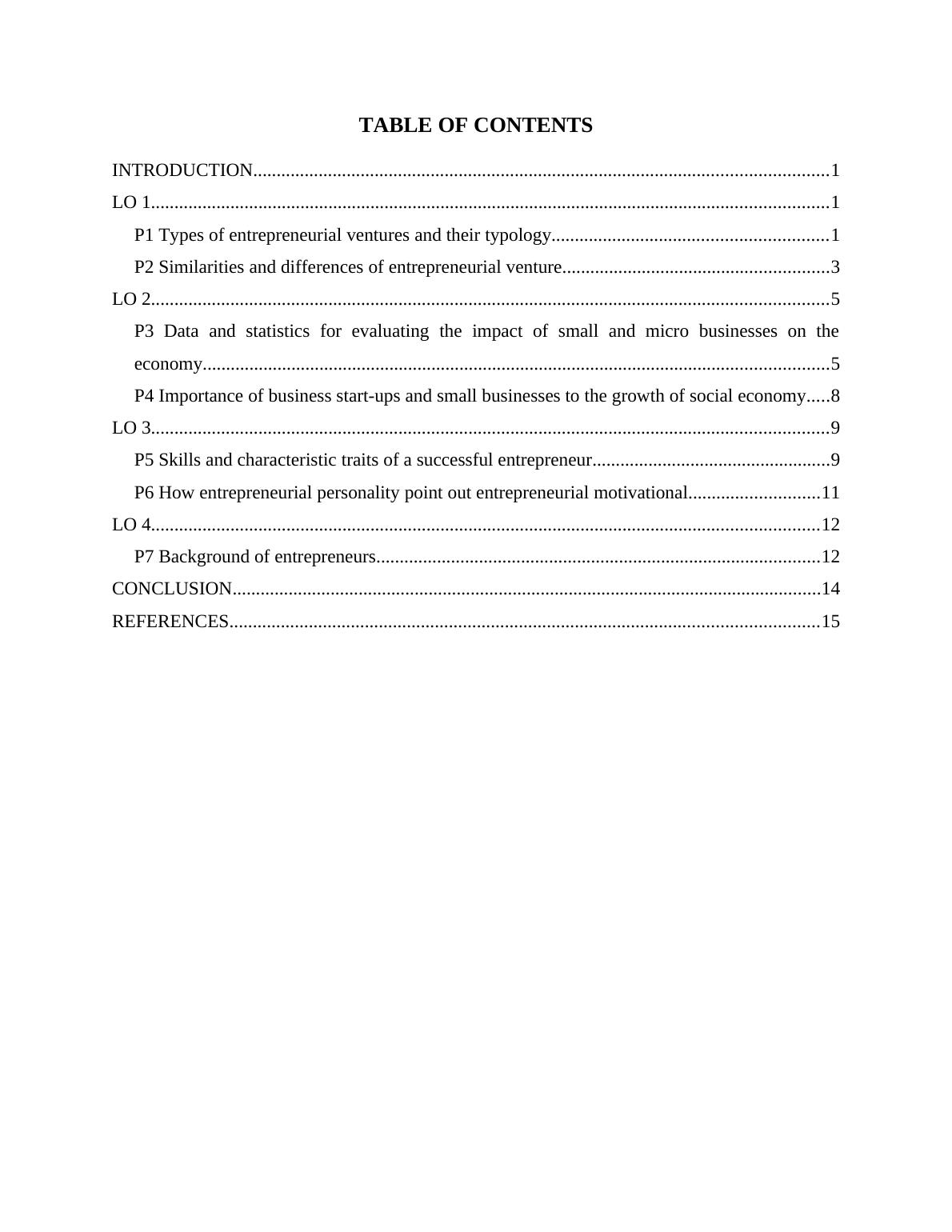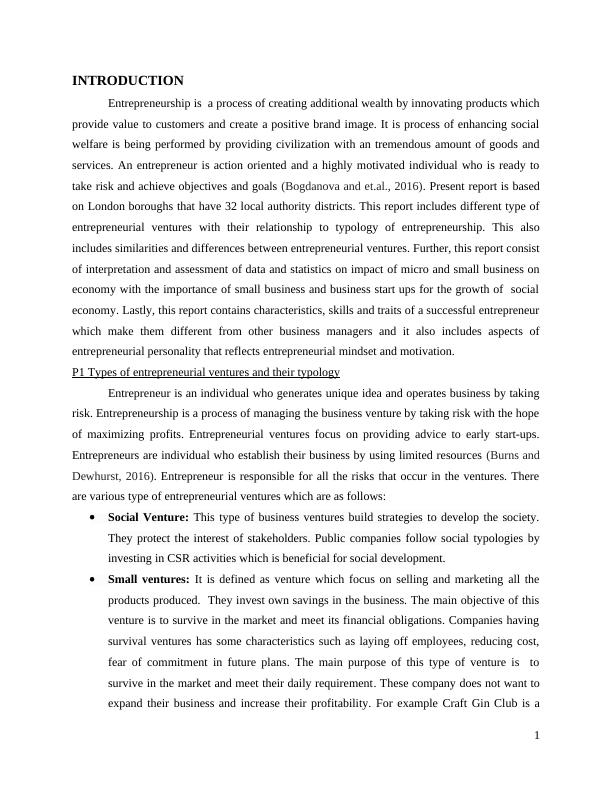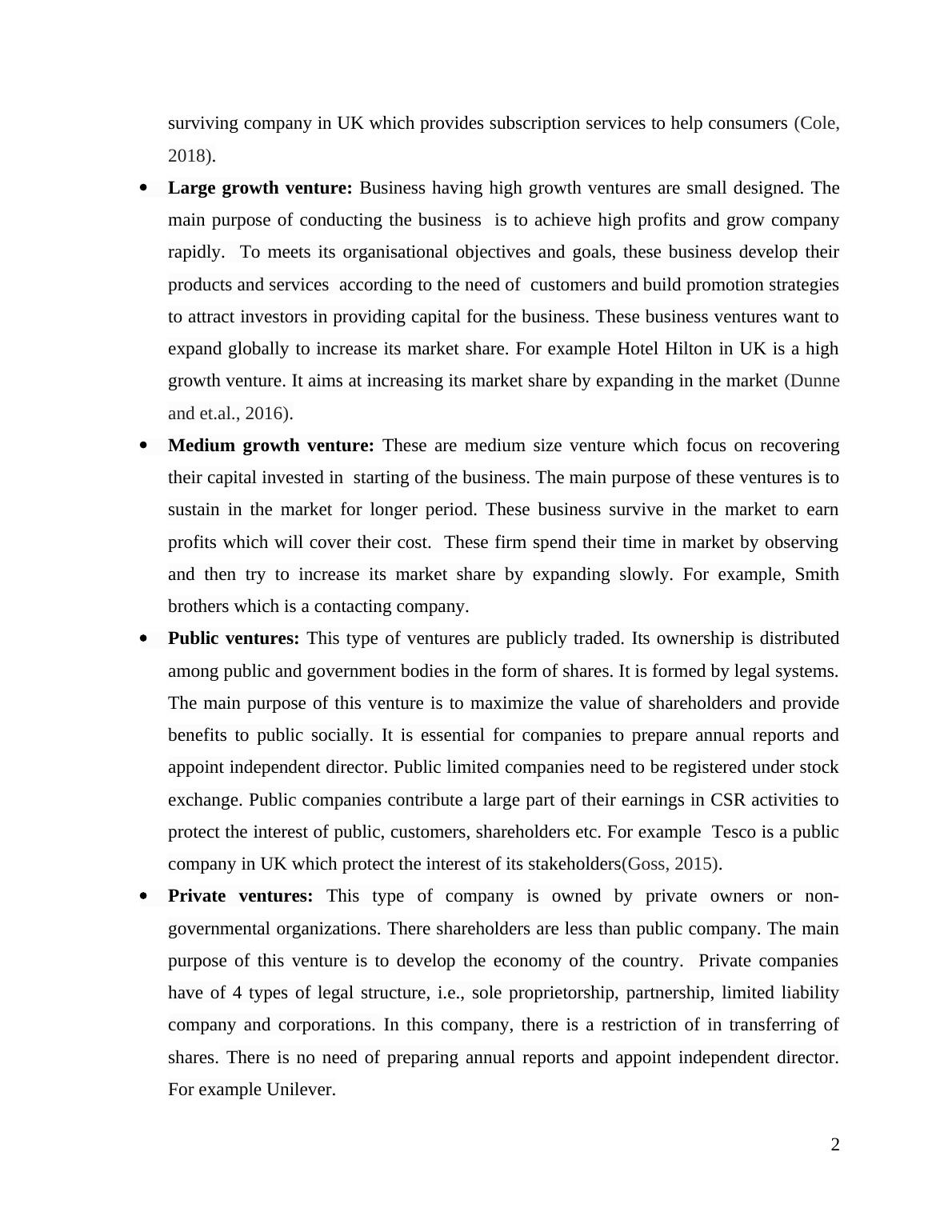Entrepreneurship and Small Business Management
17 Pages4663 Words62 Views
Added on 2023-01-18
About This Document
This report discusses the types of entrepreneurial ventures and their typology, similarities and differences between entrepreneurial ventures, and the impact of small and micro businesses on the economy. It also explores the importance of business start-ups and small businesses for the growth of social economy.
Entrepreneurship and Small Business Management
Added on 2023-01-18
ShareRelated Documents
Entrepreneurship and Small
Business Management
Business Management

TABLE OF CONTENTS
INTRODUCTION...........................................................................................................................1
LO 1.................................................................................................................................................1
P1 Types of entrepreneurial ventures and their typology...........................................................1
P2 Similarities and differences of entrepreneurial venture.........................................................3
LO 2.................................................................................................................................................5
P3 Data and statistics for evaluating the impact of small and micro businesses on the
economy......................................................................................................................................5
P4 Importance of business start-ups and small businesses to the growth of social economy.....8
LO 3.................................................................................................................................................9
P5 Skills and characteristic traits of a successful entrepreneur...................................................9
P6 How entrepreneurial personality point out entrepreneurial motivational............................11
LO 4...............................................................................................................................................12
P7 Background of entrepreneurs...............................................................................................12
CONCLUSION..............................................................................................................................14
REFERENCES..............................................................................................................................15
INTRODUCTION...........................................................................................................................1
LO 1.................................................................................................................................................1
P1 Types of entrepreneurial ventures and their typology...........................................................1
P2 Similarities and differences of entrepreneurial venture.........................................................3
LO 2.................................................................................................................................................5
P3 Data and statistics for evaluating the impact of small and micro businesses on the
economy......................................................................................................................................5
P4 Importance of business start-ups and small businesses to the growth of social economy.....8
LO 3.................................................................................................................................................9
P5 Skills and characteristic traits of a successful entrepreneur...................................................9
P6 How entrepreneurial personality point out entrepreneurial motivational............................11
LO 4...............................................................................................................................................12
P7 Background of entrepreneurs...............................................................................................12
CONCLUSION..............................................................................................................................14
REFERENCES..............................................................................................................................15

INTRODUCTION
Entrepreneurship is a process of creating additional wealth by innovating products which
provide value to customers and create a positive brand image. It is process of enhancing social
welfare is being performed by providing civilization with an tremendous amount of goods and
services. An entrepreneur is action oriented and a highly motivated individual who is ready to
take risk and achieve objectives and goals (Bogdanova and et.al., 2016). Present report is based
on London boroughs that have 32 local authority districts. This report includes different type of
entrepreneurial ventures with their relationship to typology of entrepreneurship. This also
includes similarities and differences between entrepreneurial ventures. Further, this report consist
of interpretation and assessment of data and statistics on impact of micro and small business on
economy with the importance of small business and business start ups for the growth of social
economy. Lastly, this report contains characteristics, skills and traits of a successful entrepreneur
which make them different from other business managers and it also includes aspects of
entrepreneurial personality that reflects entrepreneurial mindset and motivation.
P1 Types of entrepreneurial ventures and their typology
Entrepreneur is an individual who generates unique idea and operates business by taking
risk. Entrepreneurship is a process of managing the business venture by taking risk with the hope
of maximizing profits. Entrepreneurial ventures focus on providing advice to early start-ups.
Entrepreneurs are individual who establish their business by using limited resources (Burns and
Dewhurst, 2016). Entrepreneur is responsible for all the risks that occur in the ventures. There
are various type of entrepreneurial ventures which are as follows:
Social Venture: This type of business ventures build strategies to develop the society.
They protect the interest of stakeholders. Public companies follow social typologies by
investing in CSR activities which is beneficial for social development.
Small ventures: It is defined as venture which focus on selling and marketing all the
products produced. They invest own savings in the business. The main objective of this
venture is to survive in the market and meet its financial obligations. Companies having
survival ventures has some characteristics such as laying off employees, reducing cost,
fear of commitment in future plans. The main purpose of this type of venture is to
survive in the market and meet their daily requirement. These company does not want to
expand their business and increase their profitability. For example Craft Gin Club is a
1
Entrepreneurship is a process of creating additional wealth by innovating products which
provide value to customers and create a positive brand image. It is process of enhancing social
welfare is being performed by providing civilization with an tremendous amount of goods and
services. An entrepreneur is action oriented and a highly motivated individual who is ready to
take risk and achieve objectives and goals (Bogdanova and et.al., 2016). Present report is based
on London boroughs that have 32 local authority districts. This report includes different type of
entrepreneurial ventures with their relationship to typology of entrepreneurship. This also
includes similarities and differences between entrepreneurial ventures. Further, this report consist
of interpretation and assessment of data and statistics on impact of micro and small business on
economy with the importance of small business and business start ups for the growth of social
economy. Lastly, this report contains characteristics, skills and traits of a successful entrepreneur
which make them different from other business managers and it also includes aspects of
entrepreneurial personality that reflects entrepreneurial mindset and motivation.
P1 Types of entrepreneurial ventures and their typology
Entrepreneur is an individual who generates unique idea and operates business by taking
risk. Entrepreneurship is a process of managing the business venture by taking risk with the hope
of maximizing profits. Entrepreneurial ventures focus on providing advice to early start-ups.
Entrepreneurs are individual who establish their business by using limited resources (Burns and
Dewhurst, 2016). Entrepreneur is responsible for all the risks that occur in the ventures. There
are various type of entrepreneurial ventures which are as follows:
Social Venture: This type of business ventures build strategies to develop the society.
They protect the interest of stakeholders. Public companies follow social typologies by
investing in CSR activities which is beneficial for social development.
Small ventures: It is defined as venture which focus on selling and marketing all the
products produced. They invest own savings in the business. The main objective of this
venture is to survive in the market and meet its financial obligations. Companies having
survival ventures has some characteristics such as laying off employees, reducing cost,
fear of commitment in future plans. The main purpose of this type of venture is to
survive in the market and meet their daily requirement. These company does not want to
expand their business and increase their profitability. For example Craft Gin Club is a
1

surviving company in UK which provides subscription services to help consumers (Cole,
2018).
Large growth venture: Business having high growth ventures are small designed. The
main purpose of conducting the business is to achieve high profits and grow company
rapidly. To meets its organisational objectives and goals, these business develop their
products and services according to the need of customers and build promotion strategies
to attract investors in providing capital for the business. These business ventures want to
expand globally to increase its market share. For example Hotel Hilton in UK is a high
growth venture. It aims at increasing its market share by expanding in the market (Dunne
and et.al., 2016).
Medium growth venture: These are medium size venture which focus on recovering
their capital invested in starting of the business. The main purpose of these ventures is to
sustain in the market for longer period. These business survive in the market to earn
profits which will cover their cost. These firm spend their time in market by observing
and then try to increase its market share by expanding slowly. For example, Smith
brothers which is a contacting company.
Public ventures: This type of ventures are publicly traded. Its ownership is distributed
among public and government bodies in the form of shares. It is formed by legal systems.
The main purpose of this venture is to maximize the value of shareholders and provide
benefits to public socially. It is essential for companies to prepare annual reports and
appoint independent director. Public limited companies need to be registered under stock
exchange. Public companies contribute a large part of their earnings in CSR activities to
protect the interest of public, customers, shareholders etc. For example Tesco is a public
company in UK which protect the interest of its stakeholders(Goss, 2015).
Private ventures: This type of company is owned by private owners or non-
governmental organizations. There shareholders are less than public company. The main
purpose of this venture is to develop the economy of the country. Private companies
have of 4 types of legal structure, i.e., sole proprietorship, partnership, limited liability
company and corporations. In this company, there is a restriction of in transferring of
shares. There is no need of preparing annual reports and appoint independent director.
For example Unilever.
2
2018).
Large growth venture: Business having high growth ventures are small designed. The
main purpose of conducting the business is to achieve high profits and grow company
rapidly. To meets its organisational objectives and goals, these business develop their
products and services according to the need of customers and build promotion strategies
to attract investors in providing capital for the business. These business ventures want to
expand globally to increase its market share. For example Hotel Hilton in UK is a high
growth venture. It aims at increasing its market share by expanding in the market (Dunne
and et.al., 2016).
Medium growth venture: These are medium size venture which focus on recovering
their capital invested in starting of the business. The main purpose of these ventures is to
sustain in the market for longer period. These business survive in the market to earn
profits which will cover their cost. These firm spend their time in market by observing
and then try to increase its market share by expanding slowly. For example, Smith
brothers which is a contacting company.
Public ventures: This type of ventures are publicly traded. Its ownership is distributed
among public and government bodies in the form of shares. It is formed by legal systems.
The main purpose of this venture is to maximize the value of shareholders and provide
benefits to public socially. It is essential for companies to prepare annual reports and
appoint independent director. Public limited companies need to be registered under stock
exchange. Public companies contribute a large part of their earnings in CSR activities to
protect the interest of public, customers, shareholders etc. For example Tesco is a public
company in UK which protect the interest of its stakeholders(Goss, 2015).
Private ventures: This type of company is owned by private owners or non-
governmental organizations. There shareholders are less than public company. The main
purpose of this venture is to develop the economy of the country. Private companies
have of 4 types of legal structure, i.e., sole proprietorship, partnership, limited liability
company and corporations. In this company, there is a restriction of in transferring of
shares. There is no need of preparing annual reports and appoint independent director.
For example Unilever.
2

End of preview
Want to access all the pages? Upload your documents or become a member.
Related Documents
Unit 09: Entrepreneurship and Small Business Management Assignmentlg...
|14
|4749
|436
(PDF) Introduction to Entrepreneurship : Assignmentlg...
|19
|5442
|2473
Small Business and Micro Entrepreneurship in the Social Economylg...
|15
|4896
|276
Entrepreneurship and Small Business Management - McKinsey Londonlg...
|15
|3498
|52
Small Business and Entrepreneurshiplg...
|18
|5243
|271
Entrepreneurship and Small Business Managementlg...
|18
|4692
|88
